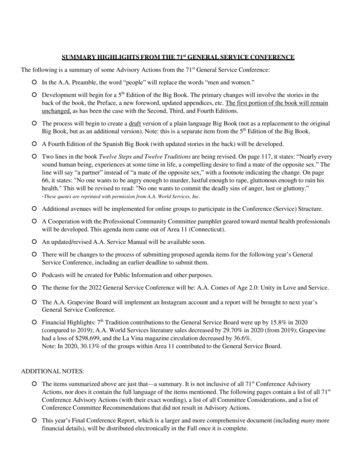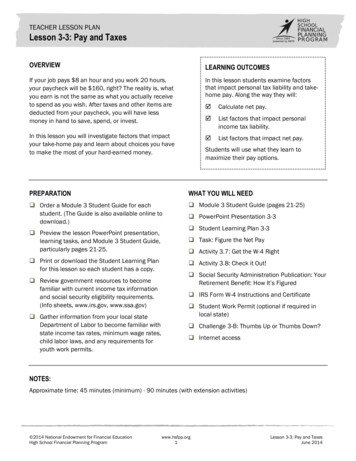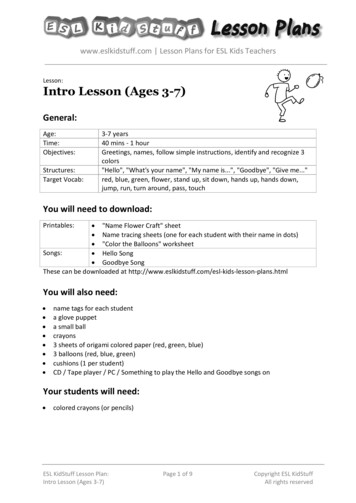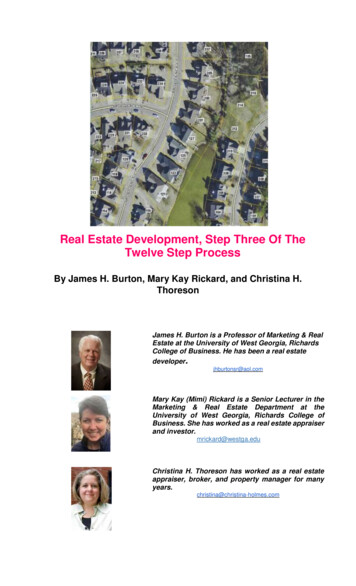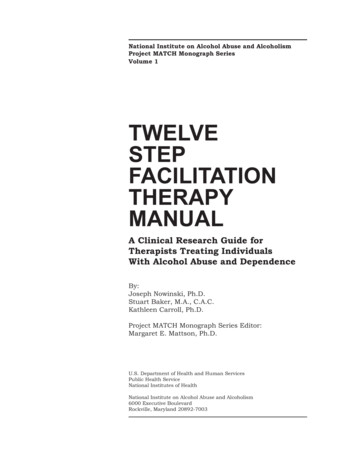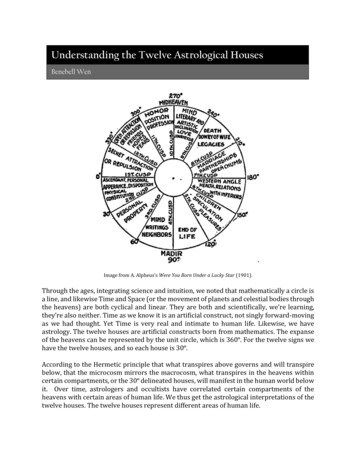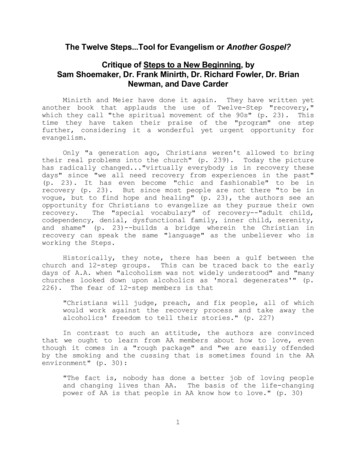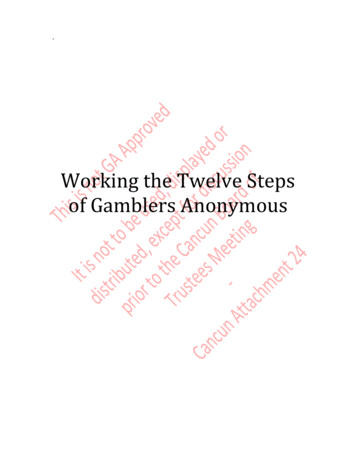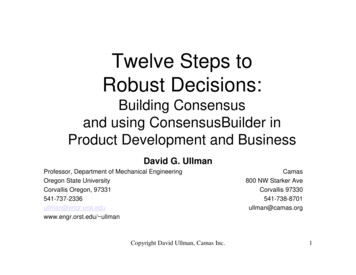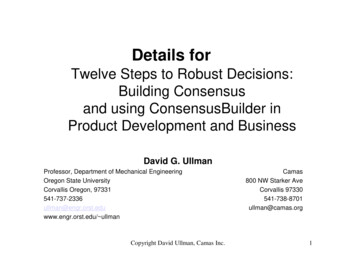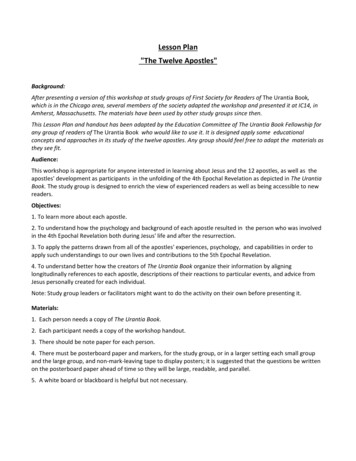
Transcription
Lesson Plan"The Twelve Apostles"Background:After presenting a version of this workshop at study groups of First Society for Readers of The Urantia Book,which is in the Chicago area, several members of the society adapted the workshop and presented it at IC14, inAmherst, Massachusetts. The materials have been used by other study groups since then.This Lesson Plan and handout has been adapted by the Education Committee of The Urantia Book Fellowship forany group of readers of The Urantia Book who would like to use it. It is designed apply some educationalconcepts and approaches in its study of the twelve apostles. Any group should feel free to adapt the materials asthey see fit.Audience:This workshop is appropriate for anyone interested in learning about Jesus and the 12 apostles, as well as theapostles' development as participants in the unfolding of the 4th Epochal Revelation as depicted in The UrantiaBook. The study group is designed to enrich the view of experienced readers as well as being accessible to newreaders.Objectives:1. To learn more about each apostle.2. To understand how the psychology and background of each apostle resulted in the person who was involvedin the 4th Epochal Revelation both during Jesus' life and after the resurrection.3. To apply the patterns drawn from all of the apostles' experiences, psychology, and capabilities in order toapply such understandings to our own lives and contributions to the 5th Epochal Revelation.4. To understand better how the creators of The Urantia Book organize their information by aligninglongitudinally references to each apostle, descriptions of their reactions to particular events, and advice fromJesus personally created for each individual.Note: Study group leaders or facilitators might want to do the activity on their own before presenting it.Materials:1. Each person needs a copy of The Urantia Book.2. Each participant needs a copy of the workshop handout.3. There should be note paper for each person.4. There must be posterboard paper and markers, for the study group, or in a larger setting each small groupand the large group, and non‐mark‐leaving tape to display posters; it is suggested that the questions be writtenon the posterboard paper ahead of time so they will be large, readable, and parallel.5. A white board or blackboard is helpful but not necessary.
ProcessWe encourage beginning with an opening prayer or worship.If it is a large group, assign people to a particular apostle at the study group and do a large group example withone apostle.1. Before the workshop is scheduled, group planners will decide how much time to devote to the workshop. Tocover all 12 apostles adequately as well as the larger perspective that emerge from the patterns about themwould ideally require at least 3 study group meetings of approximately 2 hours each. If only one session isscheduled, 5 or 6 apostles can be studied in depth and applied to the big questions and thematic discussion.Note: If all 12 apostles will be scrutinized, it is recommended the Alphaeus twins be dealt with together, asThe Urantia Book rarely deals with them as a pair.2. A facilitator will distribute handouts and note paper.3. (15 minutes, based on a 2‐hour study group) A group leader or teacher will introduce the workshop. Theleader will give an overview of the workshop and direct the group's attention to the objectives and big questionsgiven in the beginning of the handout that will be considered throughout workshop and discussed at the end.The leader will lead the group through the highlights and features of the handout. Then the leader will outlinethe objectives and procedures for the workshop. Note: This introduction should be repeated at the beginning ofeach session of the workshop should it continue for more than one meeting.4. (20 minutes, based on a 2‐hour study group) One apostle will be chosen as a model. The leader or a secondleader will lead the full group through the two pages of the specific background on that apostle as well as otherpertinent information to be found in the handout. This examination of the background, tendencies, strengths,weaknesses, reactions to specific events, etc. will serve as a model for the small groups to follow. Questions andcomments will be recorded on a posterboard.5. (30 minutes, based on a 2‐hour study group) The group will break into 4 or 5 small groups (of 4‐5 groupmembers?) each with a small group leader and each to take an in‐depth look at a specific apostle. It is definitelypreferable, but not absolutely mandatory, to have each small group leader chosen in advance so the she or hecan become familiar with the questions on that specific apostle's page and perhaps to other preliminaryresearch on that apostle. The small groups will designate a note taker and reporter to bring back to the largegroup. Each group will put its findings on the posterboard paper that has pre‐written questions.6. (25 minutes, based on a 2‐hour study group) The whole group will reconvene. All of the small groups'posterboard paper will be displayed so that everyone can see them. With one of the leaders serving asmoderator, each small group reporter will lead the group through its findings. The moderator should seekpatterns and conclusions that can be drawn.7. (30 minutes, based on a 2‐hour study group) The big questions will be discussed. The objectives of thisdiscussion will include an examination and better understanding of: patterns observed concerning therelationships among personality types, life experiences, and consequent life decisions and directions; TheUrantia Book's lessons about human psychology, the self, and the consequent impact on spiritual lives; andlessons about the experiences of workers within the 4th Epochal Revelation to us, the workers of the 5thEpochal Revelation.Evaluation:Evaluation forms are provided for group participants to fill out. The Education Committee would like to receivecopies, and we are interested in any comments the leaders might want to give us.
THE TWELVE APOSTLES:How They Became Who They Were,How Their Individual GiftsManifested Themselves Duringthe Fourth Epochal Revelation,What We Can Learnfrom Their Experiencesto Apply to Our Own Livesand Our Contributions tothe Fifth Epochal RevelationCultural Continuum: How a culture results by projecting a people's natural endowmentsthrough the lens of their environmentNatural Endowmentsof a Cultural Group (Impact of Environment)CULTURAL LENS ResultingCulturePersonal Continuum: Analogous to The Cultural Continuum, the Dynamics at work in the life of an individualNatural Endowmentsof an Individual (Impact of Experiences and Choice)EXPERIENTIAL LENS Resulting Character andSoul Development as wellas that Individual’s Impacton His or Her WorldTwo Related Readings:Paper 110:2.1 (p. 1204.5) When Thought Adjusters indwell human minds, they are always subservient to your will.Paper 160:1.2 (p. 1772.3) Human life consists in three great drives to the higher realms of unexplored ideas and undiscovered ideals.Summary of the 7 Main Suggested Readings about the Apostles’ Personalities:1) Paper 139 (p. 1548) The Twelve Apostles (Our introduction to them prior to the Ordination)2) Paper 143:3 (p. 1610) Diversion and Relaxation (Enjoined after early preaching weeks among gentiles)3) Paper 172:5 (p. 1883) The Apostles’ Attitude (Sunday evening in Jerusalem, Jesus’ final week)4) Paper 174:0.2 (p. 1897.2) Tuesday Morning in the Temple (Jesus’ personal greetings before going)5) Paper 181:2 (p. 1955) Farewell Personal Admonitions (After the Last Supper)6) Paper 191:0 (p. 2037) Appearances to the Apostles and Other Leaders(Reactions Between Morontia Appearance #7 and #8, April 9)7) Paper 192:2 (p. 2047) Visiting with the Apostles Two and Two (Morontia Appearance #13, April 21)Ending Discussion Question:Given each apostle’s personality traits, spiritual successes and struggles, and responses to key moments,what can we learn for ourselves so that we can better cooperate with our Thought Adjusters andbetter contribute to the spiritual progress of Urantia?First Society for Readers of The Urantia BookPresented at IC14, Amherst, MA, USA, July 2014Revised: December 3, 2014page1 of 28
THE TWELVE APOSTLESTimeline summary for the Twelve Apostles:January 14 – Jesus baptized by John the BaptistFebruary 23 and 24 – Jesus chose first 6 ApostlesJune 12 – John the Baptist imprisoned(After many months in prison, John was beheaded)June 23 – First 6 Apostles directed to choose another 6P. 135:8.6 (p. 1504.4)P. 137:1-2 (p. 1524 ff)P. 135:10.3 (p. 1506.5)AD 27January 12 – Ordination of the 12 ApostlesThis entire year spent quietly taking over John’s workin Perea and JudeaP. 140:0.1 (p. 1568.1)P. 141:1.5 (p. 1588.3)AD 28January 18 – March 17 – First Preaching TourMay 3 – October 3 – Training Evangelists at BethsaidaOctober 3 – December 30 – Second Preaching TourP. 146:0.1 (p. 1637.1)P. 148:0.1 (p. 1657.1)P. 149:0.1 (p. 1668.1)AD 29Third Preaching TourAugust 15 – The TransfigurationAugust 18 – September 16 – The Decapolis TourP. 150 (p. 1678 ff)P. 158:1.1 (p. 1752.3)P. 159:0.2 (p. 1762.2)AD 30February – Visit to Northern PereaApril 2-6 – Final week in JerusalemApril 6-9 – Jesus’ arrest, crucifixion, and resurrectionMay 18 – The Master’s ascensionP. 166:0.1 (p. 1825.1)P. 171 ff (p. 1867 ff)P. 183 ff (p. 1971 ff)P. 193:5.1 (p. 2057.3)AD 26P. 138:1.1 (p. 1538.3)If it happened todayCITATIONS are noted as follows:Paper # [colon] Section # [period] paragraph # (page # [period] paragraph #)With Upper Case “P.”(with lower case “p.”)Revised: December 3, 2014page2 of 28First Society for Readers of The Urantia BookPresented at IC14, Amherst, MA, USA, July 2014
THE TWELVE APOSTLESThe Apostles in the Order They Were Called by Jesus“Jesus was almost thirty-one and one-half years old when he was baptized.” P. 136:2.8 (p. 1512.4)From Monday, January 14, to Friday, February 22, A.D. 26, Jesus spent forty days in the Perean hills.On Saturday, February 23, and Sunday, February 24, A.D. 26, Jesus chose the first six apostles.Chosen by Jesus1) Andrew2) Simon Peter3) James Zebedee4) John Zebedee5) Philip6) NathanielAgewhen called333030242725pages4 and 56 and 78 and 910 and 1112 and 1314 and 15-------------Four months later, on Sunday, June 23, A.D. 26, Jesus announced that he desired to ordain a total of twelveapostles and authorized each of the first six to choose one man from among his early converts for membershipin the projected corps of apostles. After two weeks of personal work, the first six apostles made theirnominations in early July, A.D. 26. “Jesus, after each man had presented his selection for the newapostleships, asked all the others to vote upon the nomination; thus all six of the new apostles were formallyaccepted by all of the older six.” P. 138:2.2 (p. 1539.5)Nominated and accepted7) Matthew Levi8) Thomas Didymus9) James Alpheus10) Judas Alpheus11) Simon Zelotes12) Judas IscariotAgewhen called312926262830Recommended byAndrewPhilipJames ZebedeeJohn ZebedeeSimon PeterNathanielpages16 and 1718 and 1920 and 2122 and 2324 and 25Jesus was not afraid to identify himself with business men, laboring men, optimists,pessimists, philosophers, skeptics, publicans, politicians, and patriots.P. 139:11.8 (p. 1565.5)AppendixpageA:Prior Occupation, Apostolic Position, and What He Most Admired About Jesus26B:The 12 Apostles and Some Known Facts about Their Family Life27C:The 12 Apostles and Their Life Work after Jesus’ Ascension28First Society for Readers of The Urantia BookPresented at IC14, Amherst, MA, USA, July 2014Revised: December 3, 2014page3 of 28
ANDREW: The first apostle chosen1a) Andrew’s Strengths:He was the peer of his associates in almost every way (excepting oratory); he was a good organizer buta better administrator; he was an efficient personal worker; he rendered a promptdecision on everymatter brought to his notice that was within the domain of his authority; he was the best judge of men;he had a great gift for discovering the hidden resources and latent talents of young people; he was aman of clear insight, logical thought, and firm decision; he had superb stability; he was one of thoseall-round, even-tempered, self-made, and successful men of modest affairs. P. 139:1 (pp. 1548-1550)1b) Andrew’s Weaknesses:He was never an effective preacher; his temperamental handicap was his lack of enthusiasm; he manytimes failed to encourage his associates by judicious commendation; he had a reticence to praise theworthy accomplishments of his friends. P. 139:1 (pp. 1548-1550)2) Andrew’s emotional state after weeks of teaching in gentile cities and working with John’s followers:Andrew’s head was full of problems. P. 143:3.5 (p. 1611.3)3) Andrew’s reaction to the Palm Sunday entry into Jerusalem, as they returned to Bethany:Andrew was thoroughly bewildered, well-nigh confused. Andrew was busy watching some of hisassociates whom he feared might be led away by their emotions during the excitement, Andrewwas troubled with serious doubts, he was too busy with the responsibilities of his office to beotherwise affected. P. 172:5.2 (p. 1884.1)4) Jesus’ personal greeting to Andrew on Tuesday morning before going into Jerusalem:To Andrew he said: “Be not dismayed by the events just ahead. Keep a firm hold on your brethren andsee that they do not find you downcast.” P. 174:0.2 (p. 1897.2)5) Jesus’ words of personal advice and parting blessing to Andrew after the Last Supper included:“ do your utmost to promote peace and harmony among the various groups of sincere gospelbelievers. Dedicate the remainder of your life to promoting the practical aspects of brotherly loveamong your brethren. Be kind to my brothers in the flesh when they come fully to believe this gospel;manifest loving and impartial devotion to the Greeks in the West and to Abner in the East. ”P. 181:2.16-18 (p. 1958.3 – p. 1959.2)6) Andrew’s reaction to Resurrection Sunday morning:Andrew did much listening this day. He was exceedingly perplexed by the situation and had morethan his share of doubts, but he at least enjoyed a certain sense of freedom from responsibility for theguidance of his fellow apostles. He was indeed grateful that the Master had released him from theburdens of leadership before they fell upon these distracting times. P. 191:0.6 (p. 2038.1)7) Jesus’ words to Andrew at the last breakfast (visiting with Andrew and James) included:“Andrew, do you trust me?” “Andrew, if you trust me, trust your brethren more – even Peter. Ionce trusted you with the leadership of your brethren. Now must you trust others as I leave you to goto the Father. And then go on trusting, for I will not fail you. ” P. 192:2.7 (p. 2048.3)Revised: December 3, 2014page4 of 28First Society for Readers of The Urantia BookPresented at IC14, Amherst, MA, USA, July 2014
Observations and Inspirations from: ANDREW8) How would you summarize what kind of individualthis apostle is?9) How did this apostle’s personality traits affect himduring the entry into Jerusalem onPalm Sunday? Paper 172:5 (p. 1883) [see item #3]e10) Given the personality traits of this apostle, why did Jesus say what he did to himin Bethany on the last Tuesday before the crucifixion? Paper 174:0.2 (p. 1897.2) [see item #4]11) Given the personality traits of this apostle, why did Jesus say what he did to himat the last breakfast? Paper 192:2 (p. 2047) [see item #7]12) Did his ultimate life destinies match his tendencies and seem predictable? [see Appendix C]First Society for Readers of The Urantia BookPresented at IC14, Amherst, MA, USA, July 2014Revised: December 3, 2014page5 of 28
SIMON PETER: The second apostle chosen1a) Simon Peter’s Strengths:He was a fluent speaker, eloquent and dramatic; he was a natural and inspirational leader of men; aquick thinker; he knew his mind fairly well, therefore he was a man of quick decision and suddenaction; his great strength of character was loyalty, friendship; he was the outstanding preacher of thetwelve; he became a great and saving light to thousands who sat in darkness. P. 139:2 (pp. 1550-1552)1b) Simon Peter’s Weaknesses:He was an erratic and impulsive fellow. He had grown up permitting himself freely to indulge strongfeelings; he persisted in speaking without thinking; he was not a deep reasoner; he was distressinglyvacillating; he would suddenly swing from one extreme to the other; he was one of the mostinexplicable combinations of courage and cowardice that ever lived on earth; he disliked to descendfrom the clouds of ecstasy and the enthusiasm of dramatic indulgence to the plain and matter-of-factworld of reality. P. 139:2 (pp. 1550-1552)2) Simon Peter’s emotional state after weeks of teaching in gentile cities and working with John’s followers:Peter was overwrought and had recently been more temperamental than usual. P. 143:3.5 (p. 1611.3)3) Simon Peter’s reaction to the Palm Sunday entry into Jerusalem, as they returned to Bethany included:Simon Peter was at first almost swept off his feet by this popular manifestation of enthusiasm;but he was considerably sobered by the time they returned to Bethany that night. He was terriblydisappointed The reaction from the spectacular procession into the city was disastrous to SimonPeter; by night he was sobered and inexpressibly saddened. P. 172:5.3 (p. 1884.2)4) Jesus’ personal greeting to Simon Peter on Tuesday morning before going into Jerusalem:To Peter he said: “Put not your trust in the arm of flesh nor in weapons of steel. Establish yourself onthe spiritual foundations of the eternal rocks.” P. 174:0.2 (p. 1897.2)5) Jesus’ words of personal advice and parting blessing to Simon Peter after the Last Supper included:“Peter, I know you love me, and that you will dedicate your life to the public proclamation of thisgospel of the kingdom to Jew and gentile, but I am distressed that your years of such close associationwith me have not done more to help you think before you speak. And after you have really learnedthis needful lesson, you should strengthen your brethren and go on living a life dedicated to preachingthis gospel, ”P. 181:2.27-29 (p. 1962.1-3)6) Simon Peter’s reaction to Resurrection Sunday morning:All this day Peter characteristically vacillated emotionally between faith and doubt concerning theMaster’s resurrection. Peter would grow sorrowful when he thought that maybe Jesus did notcome to them on account of his presence among the apostles, because he had denied him that night inAnnas’s courtyard. And then he would cheer himself with the word brought by the women, “Go tellmy apostles – and Peter.” P. 191:0.4 (p. 2037.4)7) Jesus’ words to Simon Peter at the last breakfast (visiting with Peter and John) included:“Peter, do you love me?” “If you love me, Peter, feed my lambs. Do not neglect to minister to theweak, the poor, and the young. Preach the gospel without fear or favor; remember always that God isno respecter of persons. ” “Peter, do you really love me?” “Then take good care of mysheep. Be a good and true shepherd to the flock. ” “Peter do you truly love me?” “Feed mysheep. Love the flock as I have loved you and devote yourself their welfare even as I have devotedmy life to your welfare. ” P. 192:2.2-4 (p. 2047.6-8)Revised: December 3, 2014page6 of 28First Society for Readers of The Urantia BookPresented at IC14, Amherst, MA, USA, July 2014
Observations and Inspirations from: SIMON PETER8) How would you summarize what kind of individualthis apostle is?9) How did this apostle’s personality traits affect himduring the entry into Jerusalem onPalm Sunday? Paper 172:5 (p. 1883) [see item #3]10) Given the personality traits of this apostle, why did Jesus say what he did to himin Bethany on the last Tuesday before the crucifixion? Paper 174:0.2 (p. 1897.2) [see item #4]11) Given the personality traits of this apostle, why did Jesus say what he did to himat the last breakfast? Paper 192:2 (p. 2047) [see item #7]12) Did his ultimate life destinies match his tendencies and seem predictable? [see Appendix C]First Society for Readers of The Urantia BookPresented at IC14, Amherst, MA, USA, July 2014Revised: December 3, 2014page7 of 28
JAMES ZEBEDEE: The third apostle chosen1a) James Zebedee’s Strengths:Next to Peter, unless it was Matthew, James was the best public orator among the twelve; he could bea very good talker and story teller; he had an ability to see all sides of a proposition; he came thenearest to grasping the real import and significance of Jesus’ teaching; he was able to understand awide range of human nature; he was a well-balanced thinker and planner; one of the more levelheaded of the apostolic group; a vigorous individual; modest and undramatic; an unpretentious worker;he was brave and determined when his convictions were aroused and challenged.P. 139:3 (pp. 1552-1553)1b) James Zebedee’s Weaknesses:He was particularly vehement when his indignation was once fully aroused; he had a fiery temperwhen once it was adequately provoked; he had periodic upheavals of wrath; for days at a time he wasthe silent man, his one great weakness was these spells of unaccountable silence.P. 139:3 (pp. 1552-1553)2) James’s emotional state after weeks of teaching in gentile cities and working with John’s followers:James was grievously troubled in his soul. P. 143:3.5 (p. 1611.3)3) James Zebedee’s reaction to the Palm Sunday entry into Jerusalem, as they returned to Bethany:To James Zebedee, this Sunday was a day of perplexity and profound confusion; he could not graspthe purport of what was going on; James was cruelly torn by his conflicting emotions of elation andgratification at what he saw and by his profound feeling of fear as to what would happen when theyreached the temple. And then he was downcast and overcome by disappointment when Jesus climbedoff the donkey and proceeded to walk leisurely about the temple courts. James could not understandthe reason for throwing away such a magnificent opportunity to proclaim the kingdom. By night, hismind was held firmly in the grip of a distressing and dreadful uncertainty.P. 172:5.4 (p. 1884.3)4) Jesus’ personal greeting to James Zebedee on Tuesday morning before going into Jerusalem:To James he said: “Falter not because of outward appearances. Remain firm in your faith, and youshall soon know of the reality of that which you believe.” P. 174:0.2 (p. 1897.2)5) Jesus’ words of personal advice and parting blessing to James Zebedee after the Last Supper included:“ possess your soul in patience. When the new teacher comes, let him teach you the poise ofcompassion and that sympathetic tolerance which is born of sublime confidence in me and of perfectsubmission to the Father’s will. Dedicate your life to the demonstration of that combined humanaffection and divine dignity of the God-knowing and Son-believing disciple. ”P. 181:2.15 (p. 1958.2)6) James Zebedee’s reaction to Resurrection Sunday morning:James Zebedee at first advocated that they all go to the tomb; he was strongly in favor of doingsomething to get to the bottom of the mystery. It was Nathaniel who prevented them from going outin public in response to James’s urging, and he did this by reminding them of Jesus’ warning againstunduly jeopardizing their lives at this time. By noontime James had settled down with the others towatchful waiting. He said little; he was tremendously disappointed because Jesus did not appear tothem, and he did not know of the Master’s many appearances to other groups and individuals.P. 191:0.5 (p. 2037.5)7) Jesus’ words to James Zebedee at the last breakfast (visiting with Andrew and James) included:“James, do you trust me?” “James, if you trust me more, you will be less impatient with yourbrethren. If you will trust me, it will help you to be kind to the brotherhood of believers. Learn toweigh the consequences of your sayings and your doings. Remember that the reaping is in accordancewith the sowing. ” P. 192:2.8 (p. 2048.4)Revised: December 3, 2014page8 of 28First Society for Readers of The Urantia BookPresented at IC14, Amherst, MA, USA, July 2014
Observations and Inspirations from: JAMES ZEBEDEE8) How would you summarize what kind of individualthis apostle is?9) How did this apostle’s personality traits affect himduring the entry into Jerusalem onPalm Sunday? Paper 172:5 (p. 1883) [see item #3]10) Given the personality traits of this apostle, why did Jesus say what he did to himin Bethany on the last Tuesday before the crucifixion? Paper 174:0.2 (p. 1897.2) [see item #4]11) Given the personality traits of this apostle, why did Jesus say what he did to himat the last breakfast? Paper 192:2 (p. 2047) [see item #7]12) Did his ultimate life destinies match his tendencies and seem predictable? [see Appendix C]First Society for Readers of The Urantia BookPresented at IC14, Amherst, MA, USA, July 2014Revised: December 3, 2014page9 of 28
JOHN ZEBEDEE: The fourth apostle chosen1a) John Zebedee’s Strengths:The strongest trait in John’s character was his dependability; he was prompt and courageous, faithfuland devoted; a man of few words (except when his temper was aroused); he thought much but saidlittle; he was gifted with a remarkable and creative imagination; he had a cool and daring couragewhich few of the other apostles possessed; one thing is certain, John was thoroughly dependable.P. 139:4 (pp. 1553-1556)1b) John Zebedee’s Weaknesses:His greatest weakness was an inordinate but usually well-concealed conceit; he never overcame hisdisinclination to talk; he was somewhat bigoted and inordinately intolerant, but he was not the onlyone of the twelve who was tainted with this kind of self-esteem and superiority consciousness.P. 139:4 (pp. 1553-1556)2) John’s emotional state after weeks of teaching in gentile cities and working with John’s followers:John was inordinately perplexed in his heart. P. 143:3.5 (p. 1611.3)3) John Zebedee’s reaction to the Palm Sunday entry into Jerusalem, as they returned to Bethany:John Zebedee came somewhat near understanding why Jesus did this; at least he grasped in part thespiritual significance of this so-called triumphal entry into Jerusalem. he began to comprehend thesymbolic significance of this Sunday-afternoon pageant. At least, he grasped enough of the meaningof this Scripture to enable him somewhat to enjoy the episode and to prevent his becoming overmuchdepressed by the apparent purposeless ending of the triumphal procession. John had a type of mindwhich naturally tended to think and feel in symbols. P. 172:5.5 (p. 1884.4)4) Jesus’ personal greeting to John Zebedee on Tuesday morning before going into Jerusalem:To John he said: “Be gentle; love even your enemies; be tolerant. And remember that I have trustedyou with many things.” P. 174:0.2 (p. 1897.2)5) Jesus’ words of personal advice and parting blessing to John Zebedee after the Last Supper included:“ You should become the apostle of the new commandment which I have this night give you.Dedicate your life to teaching your brethren how to love one another, even as I have loved you.”P. 181:2.2-5 (p. 1955.3-6)6) John Zebedee’s reaction to Resurrection Sunday morning:All day long John upheld the idea that Jesus had risen from the dead. He recounted no less than fivedifferent times when the Master had affirmed he would rise again and at least three times when healluded to the third day. John’s attitude had considerable influence on them, especially on his brotherJames and on Nathaniel. John would have influenced them more if he had not been the youngestmember of the group. P. 191:0.2 (p. 2037.2)7) Jesus’ words to John Zebedee at the last breakfast (visiting with Peter and John) included:“John, do you love me?” “Then, John, give up your intolerance and learn to love men as I haveloved you. Devote your life to proving that love is the greatest thing in the world. It is the love ofGod that impels men to seek salvation. Love is the ancestor of all spiritual goodness, the essence ofthe true and the beautiful.” P. 192:2.1 (p. 2047.5)Revised: December 3, 2014page10 of 28First Society for Readers of The Urantia BookPresented at IC14, Amherst, MA, USA, July 2014
Observations and Inspirations from: JOHN ZEBEDEE8) How would you summarize what kind of individualthis apostle is?9) How did this apostle’s personality traits affect himduring the entry into Jerusalem onPalm Sunday? Paper 172:5 (p. 1883) [see item #3]10) Given the personality traits of this apostle, why did Jesus say what he did to himin Bethany on the last Tuesday before the crucifixion? Paper 174:0.2 (p. 1897.2) [see item #4]11) Given the personality traits of this apostle, why did Jesus say what he did to himat the last breakfast? Paper 192:2 (p. 2047) [see item #7]12) Did his ultimate life destinies match his tendencies and seem predictable? [see Appendix C]First Society for Readers of The Urantia BookPresented at IC14, Amherst, MA, USA, July 2014Revised: December 3, 2014page11 of 28
PHILIP: The fifth apostle chosen1a) Philip’s Strengths:He was a commonplace and matter-of-fact individual; he was a good steward; his strongestcharacteristic was his methodical thoroughness; he was both mathematical and systematic; he was nota man who could be expected to do big things, but he was a man who could do little things in a bigway, do them well and acceptably; they seldom found him unprepared; the strongest point about Philipwas his methodical reliability; he was not a good public speaker, but he was a very persuasive andsuccessful personal worker; he was not easily discouraged; he was a plodder and very tenacious inanything he undertook. P. 139:5 (pp. 1556-1558)1b) Philip’s Weaknesses:He was not necessarily dull, but he lacked imagination; his utter lack of imagination [symbolically] theabsence of the ability to put two and two together to obtain four; mathematical in the abstract, but notconstructive in
The Urantia Book rarely deals with them as a pair. 2. A facilitator will distribute handouts and note paper. 3. (15 mi

